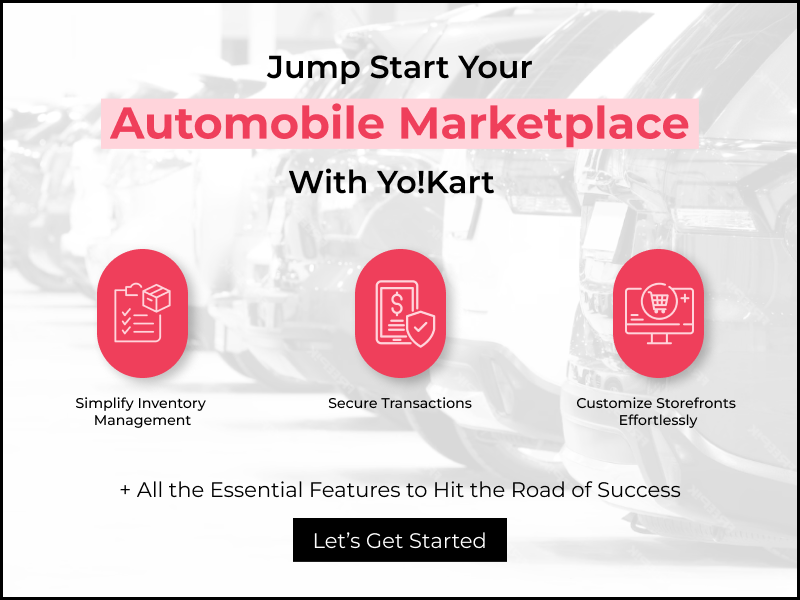Updated On: 30th November 2023
Online automobile marketplaces have been around since the late 1990s and early 2000s, with pioneers such as AutoTrader and Cars.com. These early marketplaces provided a way for customers to search and compare prices and features of cars available from multiple dealerships or individual sellers in one place. It was a significant improvement over traditional methods of visiting various dealerships or searching classified ads in the newspapers.
Over time, online automobile marketplaces have become much more sophisticated with the introduction of features such as virtual test drives, financing options, and direct purchases. This has made it more convenient to buy, sell, or trade automobiles. Such progress highlights the automobile industry’s shift towards digital platforms that enable more efficient and immersive car sales.
This write-up covers a deep analysis of the global automobile market, its leading players, and how building an automobile marketplace can be advantageous.
Table Of Contents
- The Global Market Overview of Automobile Marketplaces
- Leading Automobile Marketplace Players
- How Automobile Marketplace Works and its Revenue Model
- How Automobile Marketplaces Are Garnering Sales
- Maximizing Opportunities: The Upsides of Building an Automobile Marketplace
- Choose Between Custom or Readymade Development
- Future Trends in the Automobile Marketplace Industry
- Conclusion
- Frequently Asked Questions
The Global Market Overview of Automobile Marketplaces
The growth of online automobile marketplaces has been impressive. According to a report by Grand View Research, the global automobile market size was valued at $427.51 billion in 2022 and is expected to grow at a CAGR of 10.5% by 2028. Below are some additional key points from the report:
– The report highlights the opportunities in emerging markets such as Latin America and Asia-Pacific, where the demand for online vehicle sales is rapidly increasing.
– The growth is attributed to the rising preference for owning certified pre-owned cars, especially among the youth.
All these stats depict that entrepreneurs planning to launch their own automobile marketplace can expect avenues for business growth and expansion.
Leading Automobile Marketplace Players
Below are some of the popular players in the automobile industry.
AutoTrader
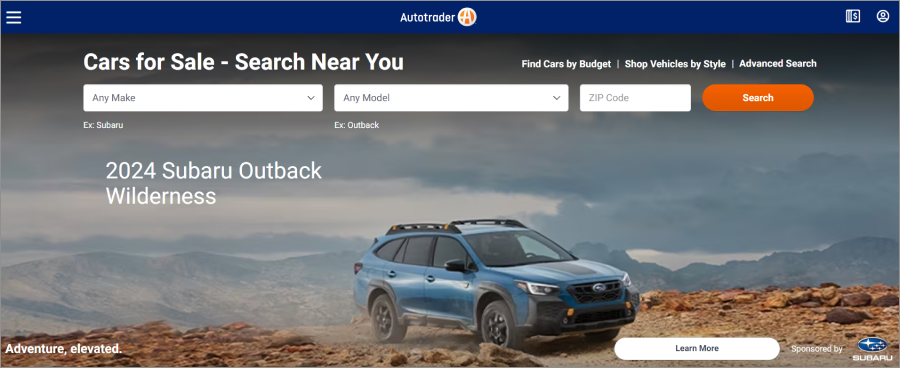
AutoTrader, founded in 1997, is a widely recognized online marketplace for buying and selling new and used cars. One of the greatest advantages of Autotrader is its ability to connect sellers with a large pool of potential buyers without any geographical barriers. AutoTrader has become a brand whose name is enough to make sure that the listed car gets ample exposure, leading to a higher likelihood of getting sold. It allows uploading multiple photos of the car, highlighting its best features, and sharing details such as new engines, stereo types, and more, helping buyers to make more informed buying decisions. Furthermore, the platform’s intuitive interface simplifies the process of creating the listings, making it easy for sellers to sell cars effectively.
Launch a User-Friendly Automobile Marketplace Like AutoTrader
Cars.com
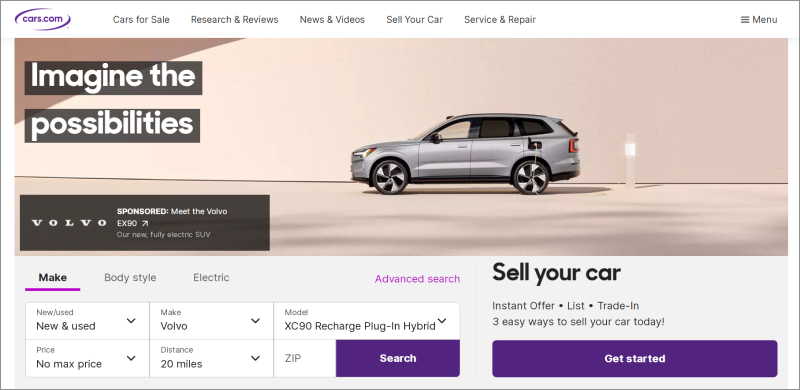
Cars.com, launched in 1998, is a well-known online marketplace for purchasing and selling automobiles. The platform has a reputation for providing easy methods to buy and sell cars and search filters for quickly finding the ideal car. An overview of automobiles including price range, pictures, reviews, and more is available. Cars.com also allows sellers to create car listings that can be privately sold on other platforms, expanding the reach of listings to a broader target audience.
CarGurus
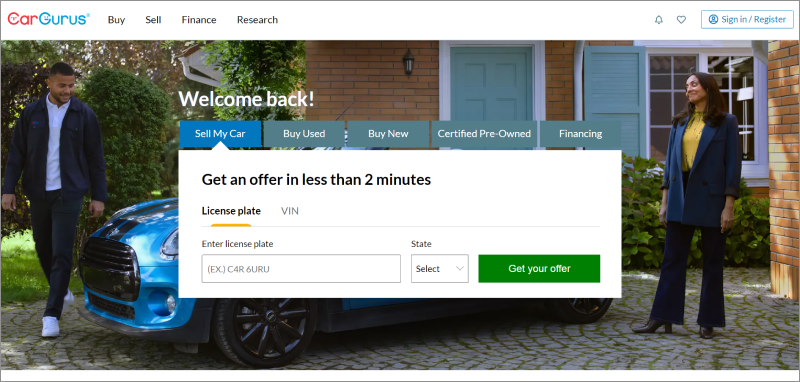
CarGurus serves as a highly effective marketplace for expediting automobile sales. The platform boasts a robust search algorithm, designed to help potential buyers compare local listings of both new and used cars and connect with the sellers for further buying process. Additionally, CarGurus offer zero-cost, online services to connect dealerships with independent sellers and extend instantaneous cash offers. Besides, CarGurus provides a pickup service, saving the sellers from worrying about delivering the car to dealers or individual buyers.
TrueCar
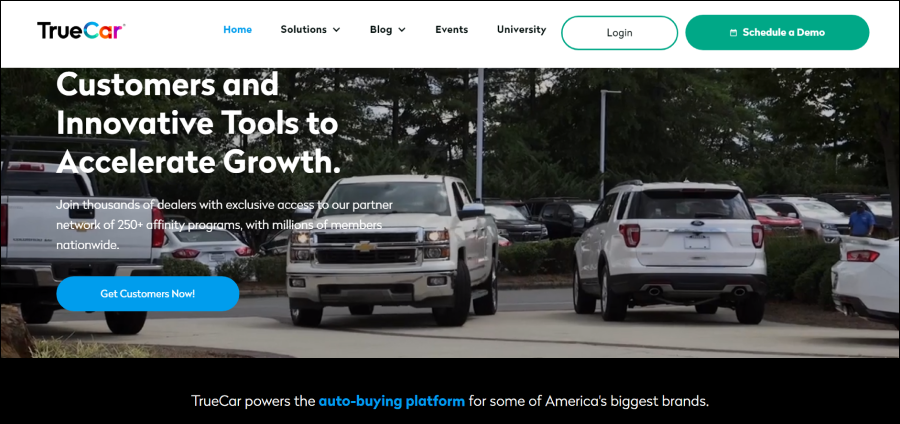
TrueCar is a digital marketplace facilitating the selling and buying of automobiles for more than 20 years now. It does not have an inventory of its own but connects the customers with the sellers offering a wide range of options: certified pre-owned, used, and new cars. There are multiple search parameters to filter the purchase such as best price, ratings, body style, and more to help buyers make confident purchasing decisions. Also, it acts as a research tool for sellers to recognize the worth of their car or how many other similar cars from the same area have been put on sale.
How Automobile Marketplace Works and its Revenue Model
An automobile marketplace works by facilitating the exchange of information and providing a secure platform for car buyers and sellers to transact. Automobile retailers including both dealerships and independent sellers can list their cars for sale on such platforms. The main participants of an automobile marketplace are sellers, buyers, and marketplace admin.
Here’s a brief explanation of each entity and their roles in the marketplace.
Marketplace Admin
The marketplace admin creates a digital infrastructure for buyers and sellers to transact. They provide support for ongoing operations such as payment processing and shipping, building a monetization strategy, and attracting potential car sellers. Thus, helping in brand building and increasing the buyer base.
Sellers
Sellers are those who list cars for sale on the marketplace. They fill out the registration form with all the key details and submit their request. Once approved by the admin, the sellers can start setting up their inventory by adding cars and their accurate and detailed information including descriptions, photos, pricing, tax categories, and more. They may also be required to verify the ownership of the vehicle and provide proof of registration or insurance.
Buyers
These are the buyers or car dealers who are looking to purchase a car. They can sign up on the platform and search for cars using various search parameters such as make model, availability, price, and location. Also, they can explore information such as extensive rankings, car reviews, and price comparisons. Once they find a car they want, they can contact the sellers directly to ask any queries, arrange a test drive, negotiate the price, and finalize the purchases.
Revenue Models for an Automobile Marketplace
An automobile marketplace can leverage revenue models but the choices would be made based on the platform’s objectives, target market, and competitive landscape while maintaining a balance between user satisfaction and profitability. Below are some frequently leveraged revenue models by automobile marketplaces.
- Transaction Fees: For online automobile marketplaces, charging a transaction fee on each sale made via the website is a great source of recurring revenue. This fee can be charged to both buyers or sellers or only one party. Moreover, services like loans or vehicle inspections may be charged a specific fee by the marketplace platform.
- Advertising: The automobile marketplace can generate revenue by displaying product advertisements to the platform users. These ads can be executed in the form of sponsored listings or banners and can be based on parameters such as customer behaviors and preferences.
- Subscription Fees: Many automobile marketplaces offer subscription packages to dealers or sellers, providing access to additional features such as analytics, premium listings, enhanced support, etc., and charge subscription fees from the sellers who want access to such packages.
In an online automobile marketplace, there are distinct roles and features associated with the users. The sellers showcase their vehicles, buyers find options that match their preferences, and the platform delivers a smooth and secure transaction process.
Let’s now discuss the essential features an automobile marketplace platform must be equipped with.
Features for Admin
- User Management: Allows admin(s) to approve or reject the seller accounts, manage seller-buyer communication, and handle disputes, ensuring a secure and smooth user experience.
- Shipping and Tax Management: Allows oversight and control over shipping logistics and vehicle tax calculations to ensure transaction transparency and accuracy.
- Payment Gateways: Facilitates secure and efficient online transactions by integrating various payment methods like credit cards, debit cards, digital wallets, and more.
- Reports and Analytics: Gathers and analyzes data related to sales, trends, user behaviors, and other key metrics for optimizing the platform’s performance and better decision-making.
Features for Sellers
- Vehicle Listings: Enable sellers to create listings for vehicles with detailed information to attract potential buyers effectively.
- Separate Vendor Storefronts: Vendors can showcase their offerings uniquely while building a unique brand identity and fostering personalized shopping experiences for customers.
- Inventory Management: Allows sellers to manage their inventory by adding new products, updating stock levels, and removing sold vehicles.
- Marketing Features: Sellers can utilize marketing strategies like PPC advertising, SEO tools, and more to enhance visibility, attract more buyers, and drive sales.
Features for Buyers
- Advanced Search Filters: Easily find desired vehicles by specifying preferences such as make, model, mileage, and price range.
- Inquiries and Negotiation: Initiate inquiries, request information, schedule test drives, and negotiate prices directly with sellers for a seamless purchasing journey.
- Communication Channels: Offer multiple and secure messaging systems to facilitate clear and confidential communication between buyers and sellers, prioritizing privacy and security for both parties.
Reviews and Feedback: Access insightful reviews to assess seller credibility, vehicle quality, and transaction security, assisting informed decisions for future buyers.
How Automobile Marketplaces Are Garnering Sales
The emergence of automobile marketplaces is driven by several factors that further garner sales. A few of them are listed below.
Convenience
Purchasing and selling convenience is one reason for increased online automobile sales. The advent of automobile marketplaces has made it easy for buyers to browse cars at their leisure. Furthermore, marketplaces such as AutoTrader have simplified the research process, allowing buyers to filter their search based on multiple parameters and find the relevant car options. On the other hand, the sellers can showcase multiple car options without any need to maintain the physical inventory of the same in real-time, increasing the overall sales.
Booming Digital Technologies
The proliferation of digital technologies has significantly contributed to the paradigm shift toward online automobile purchases. The ubiquity of smartphones and tablets has empowered consumers to shop for cars anytime and anywhere. Additionally, online automobile marketplaces are now optimized for mobile devices which enhances the browsing and purchasing experience on the go. Consequently, the need for consumers to visit stores in person has been reduced.
Price Transparency
The online automobile marketplaces are more transparent than traditional dealerships, allowing registered sellers to provide clear information to the potential buyers such as cost breakdowns, accurate car history, pricing, condition, and other aspects. As a result, customer’s trust is built by enabling them to compare prices, evaluate the overall value proposition of the vehicle, and have a more informed buying experience.
Mobile Apps
Mobile apps are convenient, easily accessible, and a great way for automobile marketplace platforms to streamline and enhance sales. These apps allow buyers to browse an extensive range of vehicles, make comparisons, and pick those that are budget-friendly and fulfill their preferences within the convenience of handheld devices. Additionally, mobile apps often incorporate secure payment gateways and financing choices, facilitating seamless transactions and boosting overall sales of automobile marketplaces.
Maximizing Opportunities: The Upsides of Building an Automobile Marketplace
Network Effects
An automobile marketplace can benefit from network effects, where platform recognition increases as buyers and sellers join. As the number of users grows, the marketplace becomes more attractive to potential sellers and buyers, leading to increased demand and supply of automobiles. This, in turn, results in more transactions and more revenue for marketplace owners.
Go Beyond Geographical Barriers
Usually, brick-and-mortar automobile stores are bound to particular locations that pose challenges for buyers as they have to visit the shops in person for exploring the options and performing test drives. On the contrary, automobile marketplaces enable buyers to compare car options from multiple brands, offer virtual test drives, and allow them to book vehicles at their convenience without any geographical barriers. As a result, brand recognition and customer trust in the marketplace are built.
Analytics for Improved Performance
Operating an automobile marketplace provides admin(s) with access to valuable data and insights. The marketplace can use analytical tools to track buyer behavior such as search queries, preferences, and purchase history. This data can be further used to improve the platform’s user experience, enhance search functionality, and deliver advanced recommendations.
Wide Customer Base Expansion
An automobile marketplace expands the customer base significantly beyond the local market. The platform can attract buyers and sellers from multiple locations, offering a wide selection of cars and reaching a larger audience. As a result, the marketplace can enjoy a competitive advantage over traditional car dealerships that are restricted to a local market.
Leverage Technological Advancements
Customers have become more comfortable and inclined toward digital payments. Besides payments, customers also prefer test drives which is why the industry has started to adopt virtual reality and augmented reality options. Such technologies enable the customers to sit inside the car, zoom in, and explore the vehicle’s interior and exterior, resulting in a whole new level of customer engagement. Hence, embracing technological advancements is essential to stay ahead of trends and competition in the automobile sector.
Leverage the Benefits of Building Your Automobile Marketplace
As you have explored automobile marketplaces and how these are leading the way towards enhanced customer experience, now we cover the approaches to building your automobile marketplace effortlessly.
Choose Between Custom or Readymade Development
The choice of development approach significantly impacts the critical drivers of marketplace success such as extensibility and scalability. There are options such as custom development or building a marketplace using readymade marketplace software. Let’s discuss these below.
Custom-Built Marketplace
A custom-built development approach provides complete control over the design, functionality, and features of the marketplaces. However, building an automobile marketplace from the outset would either require a team of in-house experts or outsourcing the development needs to professional development firms. It would further require significant time for development. Thus, increasing the time-to-market of business. Moreover, the capital investment would be much higher as upgrades and maintenance would be required.
Readymade Marketplace
The turnkey solutions come with core marketplace features and functionalities, cutting down the development cost and time as compared to the custom-built approach. It reduces the business’s time-to-market and focuses on incorporating unique capabilities that resonate with the user’s wants. You just need to buy, install, and begin using the marketplace.
Quickest Way to Launch Your Automobile Marketplace: Yo!Kart
Yo!Kart is a well-known marketplace software developed using agile techniques and designed to build highly scalable multi-vendor platforms. Differing from open-source SaaS products, Yo!Kart offers a comprehensive readymade solution, complete with a host of features for efficient order management, vendor management, and catalog management. One main advantage of Yo!Kart software is its flexibility as it is easily customizable. As the needs of the marketplace evolve, entrepreneurs can easily make changes to the platform, add new features, integrate third-party modules, and update the design. This adaptability enables businesses to stay competitive and relevant in a rapidly changing market. Furthermore, Yo!Kart operates on a licensed-based model that offers customers lifetime ownership of the software with a one-time payment.
Other Key Features:
– Multilingual functionality
– Separate user panels for admins, sellers, and buyers
– Easy customization
– Advanced reporting and analytics
– Multiple payment gateways
– Multicurrency
– Personalized marketing features
Build a Scalable Automobile Marketplace With Our Readymade Solution
Future Trends in the Automobile Marketplace Industry
Undoubtedly, the automobile industry is transforming gradually and predicting future trends propelled by changing customer preferences and technological advancements. Below are shared some insights into the potential future trends.
Rise of Electric Autonomous Vehicles
With the growing concerns about environmental impact and technological advancements, electric and autonomous vehicles are expected to dominate in the automobile industry. The online marketplace will likely witness a surge in listings and sales of electric cars as the infrastructure for charging stations will continue to expand.
Enhanced Virtual Showrooms
Online automobile marketplace platforms will increasingly invest in virtual showrooms and Augmented Reality. Customers will experience vehicles virtually, explore their features, and even test drives from the comfort of their vicinity. This immersive experience will significantly impact purchase decisions and increase customer satisfaction.
Progressive Technology
Connected cars have gained huge traction among customers due to their integration of advanced technology, offering multiple benefits. These vehicles provide real-time data, navigation assistance, entertainment services, and enhanced safety features, catering to the increasing consumer demand for convenience, efficiency, and safety on the roads. Additionally, the evolution of smart cities and the Internet of Things (IoT) ecosystem further boosts the appeal of connected cars, allowing seamless integration with other devices and systems. As a result, the desire for enhanced connectivity and personalized experiences will continue to reshape the automobile industry.
Sustainability
Customers are constantly inclined towards environment-friendly choices. Expect online automobile marketplaces to highlight and promote eco-friendly vehicles and sustainable practices, appealing to eco-conscious customer segments.
Conclusion
The rise of the internet and smartphones has already created multiple avenues of revenue generation, pushing entrepreneurs towards online marketplaces capable of meeting the needs of today’s tech-savvy customers. With the flourishing automobile industry, entrepreneurs can think to set their foot to leverage profitable opportunities. So, if looking to start your own automobile marketplace, Yo!Kart would be an ideal solution. It can facilitate the creation of a successful marketplace for buying and selling cars, equipped with essential features and providing comprehensive support through the initial stages and beyond.
Frequently Asked Questions
Q1. How do I attract sellers and buyers to my automobile marketplace?
Ans: To attract buyers and sellers to your automobile marketplace, focus on creating an easy-to-use platform with robust search filters and intuitive navigation. Implement marketing strategies targeting both sellers and buyers such as advertising, campaigns, and more. Additionally, offer secure payment gateways, vehicle history reports, and a simplified selling process to increase credibility and engagement.
Q2. How do I choose the right eCommerce software to build an automobile marketplace?
Ans: The choice of the right eCommerce software depends on multiple parameters such as ease of use, features and integrations, budget, and support system. Also, building an automobile marketplace platform requires an emphasis on security measures. Hence, assess your needs, do in-depth research, and compare the software choices for informed decision-making.
Q3. How much does it cost to build an automobile marketplace platform like Autotrader?
Ans: The cost of building an online automobile marketplace like Autotrader varies on diverse factors. It includes coding skills and technical expertise, specific feature-set, platform complexity, and more. Besides, choosing between outsourcing the development requirement or leveraging a turnkey eCommerce automobile marketplace software would impact the expenses. Opting for a readymade automobile eCommerce software typically falls within a range of approximately $1249 with all the standard features included. For detailed pricing, check out the page.




